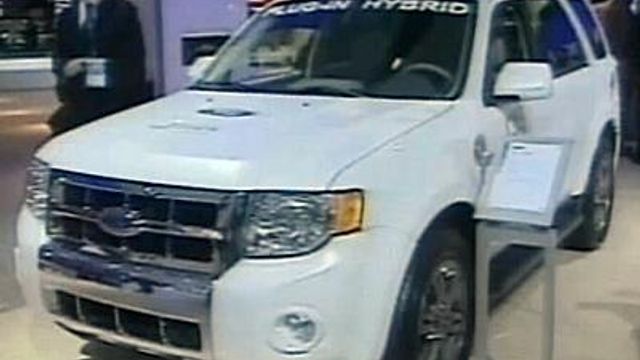Easley Announces Program for Plug-In Hybrid Cars
Progress Energy, Duke Energy and North Carolina State University have teamed up with the state to look at new ways to use electric cars.
Posted — UpdatedN.C. State will partner with Duke Energy Corp. and Progress Energy Corp. General Motors Corp. may also join the program.
During the speech, Easley talked about the creation of the Wolfpack Power Pack, a reference to N.C. State's mascot. He expects to have some tangible advancements in two to five years.
Duke Energy Corp. and Progress Energy Corp. said they have both pledged to participate in the project and are already developing a grid system that would allow drivers to charge their car batteries while away from home.
The ATEC will focus on three things:
- A battery that is lighter, stronger and cheaper. This will be a lithium ion technology hopefully going from a current $10,000 price to around $3,000.
- Set up a grid power system for people to recharge their cars along the highway system.
- Building a safer and lighter and more aerodynamic car.
The next generation of plug-in hybrid vehicles will run mainly on the battery power with gasoline backup, getting more than 100 miles per gallon, officials said. The batteries can be charged by plugging into a typical household outlet. Today’s Toyota Prius, for example, gets about 50 miles per gallon.
Widespread use of plug-in hybrid vehicles, according to recent estimates, will decrease domestic dependence on foreign oil through greater fuel efficiency.
Improving fuel efficiency on cars in the U.S. by 2.7 miles per gallon would equal all of the nation’s imports from the Persian Gulf. It would also benefit the environment by cutting the greenhouse gas emissions by as much as 27 percent, according to the EPA.
“Growth in the use of plug-in hybrid technology and infrastructure opens the door for North Carolina and N.C. State to be leaders in creating a workforce for advanced transportation,” said N.C. State Chancellor James Oblinger. “N.C. State was selected to house the Advanced Transportation Energy Center because of our proven research capacity and expertise in battery and photovoltaic research as well as our ability to build the partnerships needed to make the center a success.”
Easley said North Carolina must be a leader in helping control energy costs, using fuel more efficiently and caring for the environment.
“It is the North Carolina way to take bold steps,” Easley said. “With the dawn of the 21st century, North Carolinians have emerged as innovators and leaders in education, technology and the environment. It is time for us to take the lead in the new energy economy.”
The governor last August signed into law a bill to enact a Renewable Energy and Energy Efficiency Portfolio Standard. It made North Carolina the first state in the Southeast to do so.
Drivers, meanwhile, would save on the cost of gasoline. For a vehicle with a range of 40 miles, it could cost roughly $1 to charge the battery, said Michael Ligett, the director of market and energy services for Progress Energy. Easley said he would like to see batteries with a longer range such as 150 miles.
• Credits
Copyright 2024 by WRAL.com and the Associated Press. All rights reserved. This material may not be published, broadcast, rewritten or redistributed.





